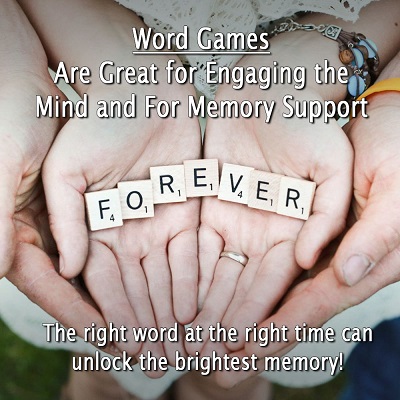 What’s the first word game that comes to your mind? It may be Scrabble, because it’s definitely a game you can play with others, and perhaps you have fun memories learning and playing the game too! Whatever game you thought of, all word games can be a wonderful way to connect with someone experiencing memory loss.
What’s the first word game that comes to your mind? It may be Scrabble, because it’s definitely a game you can play with others, and perhaps you have fun memories learning and playing the game too! Whatever game you thought of, all word games can be a wonderful way to connect with someone experiencing memory loss.
Word games are designed to stimulate memory and improve language skills, and they can be adapted to suit any age or level of cognitive decline.
Word Games You Can Play Together
Let’s take a look at some word games that can be both beneficial and fun for someone with memory challenges. You’ll find tips on adapting these games to meet their needs, along with suggestions to make each session fun.
Crossword Puzzles
Of course, this one is the first on the list. It may even be a household favorite. Perhaps your loved one with memory issues once completed crosswords easily. So if they are challenging now, simply choose easier crosswords! They don’t have to be the cryptic ones.
There are large print crosswords available, which are also easier on the eyes and a bit more manageable. Plus, they are quicker to finish which makes the person feel they have completed one without feeling frustrated with their efforts.
Make sure the clues are easy too. You might read the clue aloud and talk through potential answers, helping them feel involved. It would be nice to let them guess the clue, even if you gave it to them with your suggestions.
The reason crosswords are so good for helping someone with memory loss is because they give little prompts that can stir memories and vocabulary recall. Even if they need a bit of help with clues, it can be rewarding for them as they think of the right answer and add it to the grid.
Scrabble and Other Simple Word Building Games
If they can still work through jumbled letters, Scrabble can be an excellent way to get their mind active and engaged. For an easier game, you could change the rules! For example, you could consider using shorter words or focusing more on forming words rather than keeping score. Even if you let them have extra turns because you don’t have a word to place.
If you help them find familiar words or guide them through options, it can make it a relaxing activity rather than a competitive one.
Categories or ‘Scattergories’
Have you ever played this game? Categories is a simple game that involves naming items within a certain category, like fruits, colors, or animals. It can be as easy or as challenging as they can handle.
To play, all you have to do is pick a broad category, and then take turns naming items that fit within that category. So if you choose animals, you take turns trying to think of an animal – dog, cat, lion, elephant etc. The game continues until you run out of ideas or decide to switch to a new category.
Why this game is beneficial is because it helps to tap into the person’s stored memory bank! They have to think about what fits into what category. It’s a flexible game that can be played at any pace, and at any time. You can even choose categories based on their interests or memories. For example, if they like gardening, sewing, fishing, cooking etc.
Rhyme Time
It sounds like fun and it is! Rhyme Time is a game where you take turns coming up with words that rhyme with each other.
Begin by saying a word with a simple sound, for example, tea. Then, work together to think of as many rhyming words as possible, such as me, flea, bee, she, he etc. To keep it light and enjoyable, you could start with words that have many common rhymes.
This game is so simple, yet it helps the person with memory loss feel like they have succeeded when they think of a word, which can boost their confidence.
Alphabet Game
This game is exactly how it sounds. You have to think of a word for each letter of the alphabet, but to add a bit extra, you can choose a specific theme.
To start, choose a category, such as food or places. Then, take turns naming something that fits each letter of the alphabet. For example, for the theme on places, the first letter is A, so it could be Australia, B for Brazil and so on.
If the topic is too difficult and you see they are becoming frustrated, choose a different topic. Don’t just stop and quit, choose something easier and make them feel like a winner. The Alphabet Game is designed to encourage memory recall and logical thinking, and can be adapted to suit their comfort level, so make sure it is.
We all know that all work and no play makes Jack or Jill a dull girl or boy, so why not play a word game every day with someone you care about? They need you as much as you need them.
By playing word games with someone experiencing memory loss, you are helping them to see, with every word they find or guess, that they can still remember some things. It’s not hard to keep their mind active and memory sharp by playing a word game or two with them, and as often as you can!






